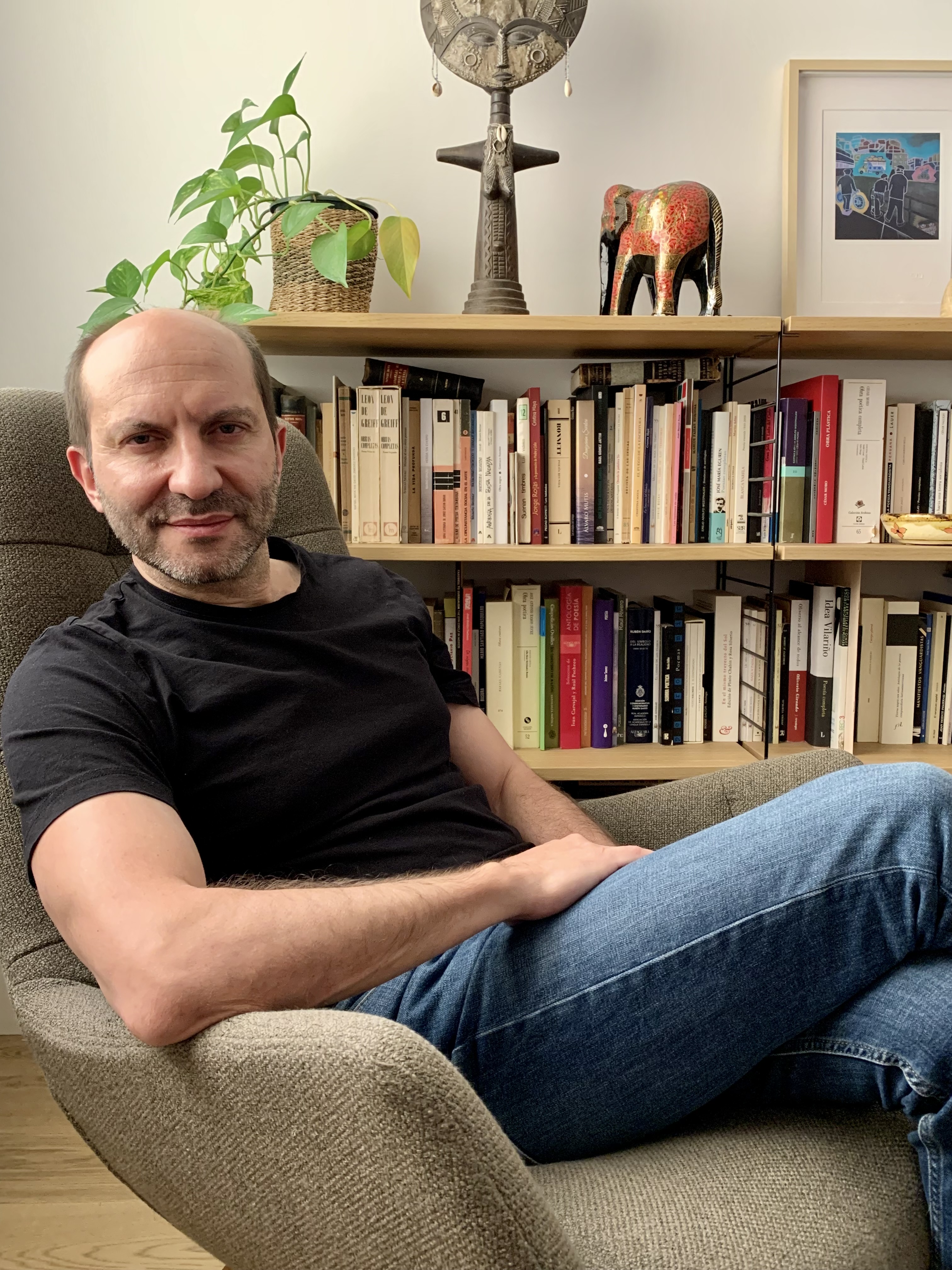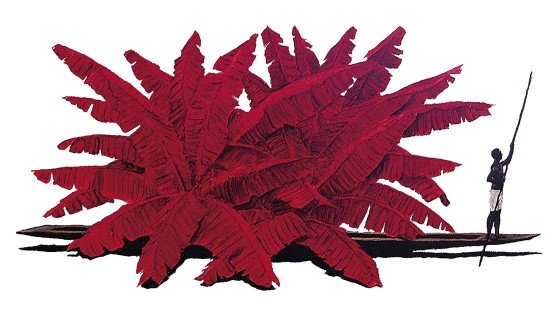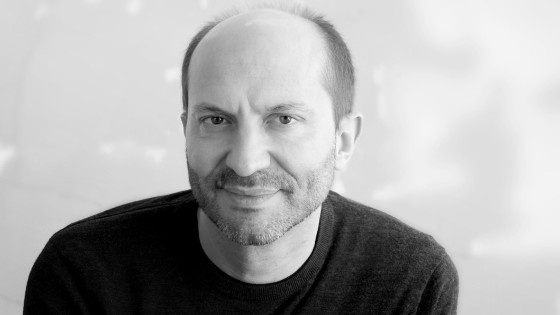Carlos Granés “Delirio Americano”

Master Conference "Delirio Americano"

Who is Carlos Granés?
Carlos Granés, born in Bogotá in 1975, holds a Ph.D. in Social Anthropology from the Complutense University of Madrid, where he was awarded the Outstanding Doctoral Thesis Prize. He is the author of several acclaimed works, including 'La revancha de la imaginación' (CSIC, 2008), 'El puño invisible. Arte, Revolución y un siglo de cambios culturales' (2011), 'La invención del paraíso. El Living Theatre y el arte de la osadía' (2015), and 'Salvajes de una nueva época' (2019), all published by Taurus.
Granés has also compiled essays by Mario Vargas Llosa in 'Sables y Utopías. Visiones de América Latina' and 'Elogio de la educación'. He is currently working on a five-volume edition of Vargas Llosa's journalistic and essayistic works. For a decade, he contributed a column to Colombia's 'El Espectador' newspaper, and now writes for the Spanish newspapers 'ABC' and 'The Objective'.
In 2015, he delivered the Luis Ángel Arango International Chair of Art lectures. His book 'El puño invisible' earned him the 2011 Isabel Polanco International Essay Prize, and in 2020, he won the Simón Bolívar National Journalism Prize. His latest books include 'Deliro americano. Una historia cultural y política de América Latina' (Taurus, 2022) and 'Antiutopías' (Angosta, 2023). For the former, he received the Open Bank by Vanity Fair award for the best essay published in Spain in 2022.
Carlos Granés' visit agenda
Tuesday, February 6 |
|
|---|---|
Time |
Activity |
|
11h30 – 13h00 |
Workshop for USFQ students*Applications will be received until January 28th. |
|
16h30 - 18h45 |
Master Conference “Delirio Americano”Venue: Shakespeare Theater USFQ *At the end of the conference there will be a space for book signing.
|
Wednesday, February 7 |
|
|---|---|
Time |
Activity |
|
10h00 – 11h30 |
Workshop for USFQ teachers*Applications will be received until January 28th. |
Information
Why Should One Read Carlos Granés and His Work 'American Delirium'?
This work delves deeply into the interplay between culture and politics across the Americas from the 19th to the 21st century. It commences and concludes with two pivotal figures in American history, José Martí and Fidel Castro. Its significance lies in several key aspects:
- Thematic Relevance: The book addresses contemporary and pertinent issues related to Latin American culture and identity. Reading it can provide an in-depth understanding of the cultural dynamics within the region.
- Critical Approach: It adopts a critical perspective in its analysis, which can foster the development of critical thinking skills. The book encourages readers to question and contemplate various cultural and social viewpoints.
- Contribution to Research: For those engaged in research pertaining to Latin American culture, this book offers valuable insights and perspectives that could enrich academic endeavors.
- Knowledge Expansion: It can aid in broadening one’s knowledge about Latin American history, literature, and culture, providing a more extensive conceptual framework.
- Theoretical Foundations: The book serves as a resource for theoretical underpinnings necessary to address specific topics related to identity and culture in Latin America.
- Interdisciplinary Dialogue: It facilitates interdisciplinary dialogue by tackling subjects that encompass cultural, historical, and social aspects, a crucial element in diverse academic settings.
Regarding his work.
Latin America, Between Ideas and Deliriums
Carlos Granés (2022). American Delirium: A Cultural and Political History of Latin America. Barcelona: Taurus.
- The Latin American avant-garde was a volatile mix of European influences (Futurism, Surrealism, etc.) combined with a spirit of renewal and the quest for a distinct American identity. This movement emerged following the trauma of 1898 after the defeat by the United States, fostering anti-imperialism and the assertion of Latin American culture. Key figures included poets like Huidobro, Vallejo, and Neruda; painters such as Rivera, Sabogal, and Tarsila do Amaral; and essayists like Mariátegui and Vasconcelos. This era evolved towards political engagement, aligning with either right-wing nationalisms or fascisms (Leopardos, Lugones, Plínio Salgado), or with Marxism (Mariátegui) and movements like APRA.
- Notable groups included the Mexican muralists, Cuban minoristas, the Contemporaries, the Estridentistas, Andean Indigenism, and the Brazilian Anthropophagists. It was a time of intense creative fervor that transformed the continent's letters and arts, offering universalist proposals deeply rooted in the American experience. However, its political shift towards fascism or Marxism laid some of the intellectual foundations for later authoritarianisms.
- The Link Between Avant-Garde and Nationalism: Latin American avant-garde movements like Modernism and early 20th-century avant-gardes fostered an interest in reclaiming and affirming national and American identities. This sometimes led to authoritarian nationalist or even fascist tendencies.
- The Influence of Political Context on Culture: Post-1930, Latin America saw a succession of military coups and nationalist dictatorships that sought to use culture for legitimization. This led to a complicity between authoritarian leaders and artists.
- The Origins of Populism in the Region: Leaders like Perón or Velasco Ibarra adapted authoritarian nationalism to maintain power through elections. They instrumentalized culture, appealed to the popular masses, and eroded democratic institutions.
- The Negative American Influence on Revolutionary Turns: US interference in the region, supporting dictatorships like Somoza's or overthrowing democratic governments like Árbenz's, fostered distrust that led many left-wing movements to choose armed struggle.
- The Exacerbation of the Clash Between Democracies and Dictatorships in the Caribbean in the 1950s: While democratic leaders like Betancourt or Figueres resisted dictatorships, Fidel Castro led the Cuban revolution, ultimately resulting in another communist dictatorship.
- The Choice of Revolutionary Violence from the 1960s: The Castroist revolution led to the proliferation of socialist-inspired guerrilla movements in various countries, while right-wing military dictatorships opposed communism.
- Americanism and Nationalism have been dominant ideological currents in Latin America, with variations from right to left.
- The 1959 Cuban Revolution marked a turning point, spreading armed revolution and inspiring guerrilla movements in various countries.
- Right-wing military dictatorships in the 1970s and 1980s faced social resistance where art played a significant role in denunciation.
- The Latin American left democratized in the 1990s, shifting from armed struggle to electoral participation while maintaining nationalist rhetoric.
- The neoliberalism of the 1990s gave way to a second wave of populist governments in the 2000s, both right and left-wing.
- Indigenist discourse and victimhood have become strong trends in contemporary politics and art.
- Political polarization seems irreversible; extremes delegitimize moderate options and seek to impose a Manichean vision: either with the people or against them.
- A deep-seated authoritarian impulse persists; caudillismo remains a recurrent political alternative to weak democratic systems.
- The obsession with refounding countries implies discarding gradual, institutional solutions in favor of repeatedly undertaking messianic projects.
- A Latin American identity rooted in victimization and the inability to overcome the past prevails, along with a futile search for absolute solutions.
- Fidel Castro's death in 2016 did not cause the expected commotion but indifference, indicating that Cuba and Castroism no longer represent the ideological vanguard of Latin America (Cuba).
- José Martí's death in 1895 marked the end of the 19th century and spurred anti-imperialism in the region. Castro's death will change nothing in Cuba (Cuba).
- Castroism and Guevarism failed to conquer Latin American ideas. Neither did Peruvian APRAism from Haya de la Torre, nor the Mexican PRI (Cuba, Peru, Mexico).
- The most successful narratives have been Argentine Peronism and Indigenism, emphasizing the marginalized as victims (Argentina).
- Latin America has been instrumentalized from outside
- as a land of revolution, delirium, and exoticism. It needs to stop perceiving itself this way (general).
- The region is not prodigious or utopian, just a diverse and complex place that should coexist peacefully in democracy (general).
- The great Latin American creation has been cultural mixing, not the search for national essences (general).
- Populists invent artificial peoples instead of strengthening institutions, and liberals have failed to integrate popular sectors (general).
- Neither Arielism, Indigenism, Castroism, nor Peronism have unified societies. Perhaps a plural cultural anthropophagy will achieve this (general).
- Latin America is not tied to its past and has the same future possibilities as other regions (general).


